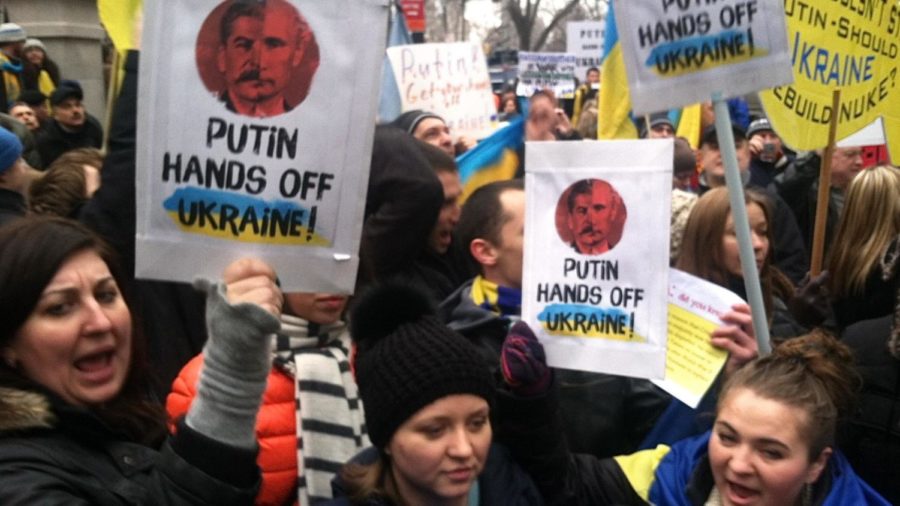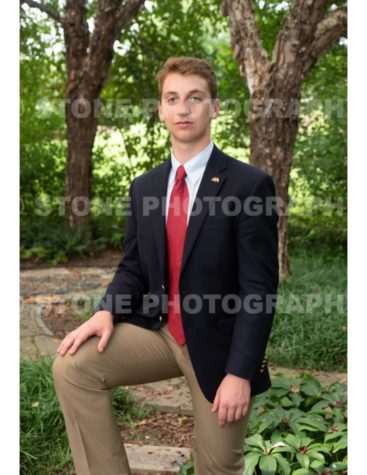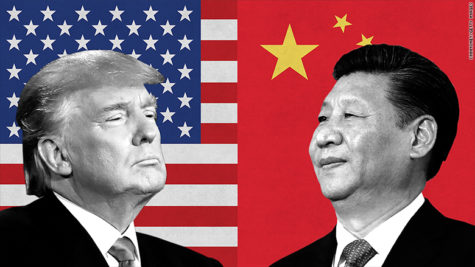Putin’s Dire Obsession with Ukraine
February 4, 2019
For centuries, Ukraine and Russia were considered as one whole. With the exception of some periods of time where Ukraine pushed for independence in the early 20th century, the two nations coexisted. With common ethnic roots, a common economy and the history of the widespread use of the Russian language in parts of Ukraine, the two societies respected each other’s goals. Ukraine was a part of the early Russian empire and the Soviet Union, and while there may have been nationalist sentiment in Ukraine, the relationship between the two nations was symbiotic, as they developed in parallel.
However, this relationship has since changed immensely. In 1991, Ukraine declared independence in an attempt to find its own future. And recently in 2014, after the Maidan Revolution in Ukraine and events that transpired as a result, as well as Russia’s annexation of Crimea, Ukraine made it clear that they were parting ways with their Russian comrades. The Ukrainian people expressed their desire to join the European community while Russia remained in search of its own destiny. It was a painful transition for both Russia and Ukraine as the two countries broke ties that day.
However, today, many Russian people respect Ukraine’s independence, and they do not support Putin’s attempts to undermine Ukrainian sovereignty. Today, The only thing that stands between the diplomacy and harmony of Ukraine and Russia is Putin’s dire obsession with Ukraine.
What is the situation between Ukraine and Russia? How does Putin meddle in Ukraine’s domestic and international affairs?
For Putin, Ukraine is most likely seen as a given part of Russia that should not be taken seriously on its own. Putin wants to continue the political culture of Ukraine’s tethering to Russia and to perpetuate the East’s dependence on Russia as a whole. He also wants to assert his dominance over Ukraine in any way possible. In November, Russia attacked Ukrainian boats, injuring three sailors. The Ukrainian navy claims that six were injured by Russian fire. However, Russia claims that the Ukrainian ships were in Russian waters.
The incident followed days of rising tensions over access to the Sea of Azov. The Ukrainian president, Petro Poroshenko, proposed imposing martial law after six crew members were injured in a major escalation between Ukraine and Russia. Chaos ensued in the streets, as Ukrainians attacked the Russian embassy in Kiev, with Russia responding by preparing forces to strike at any time. This all supposedly started when Russia prevented three Ukrainian navy vessels from passing beneath its bridge in the Kerch strait by blocking the way with a cargo ship. Ukraine had given communication that they would breach this blockade. The bottom line is that, however Putin wants to twist or turn this around, this was an act of blatant use of force. It is now Ukraine’s turn to decide what to do. Their choices are limited, but for now, both sides must consider if this conflict will escalate.
For the current Russian regime, Ukraine cannot become a part of the West. It must stay as a part of the Russian sphere of influence, according to Putin’s beliefs. There was a recent set of sanctions imposed by Russia against senior Ukrainian figures in November. This includes former Prime Minister Tymoshenko, an influential figure in today’s Ukrainian politics. In these sanctions, Russia targeted Ukrainian businesses — an evident backlash from Putin and his cronies to assert their political dominance over Ukraine.
Putin is willing to do everything in his power in order to flaunt total control in his authoritarian regime for the whole world to see. This is another one of his abuses of power in order to undermine his neighbors in Ukraine, while still keeping his legitimacy and stability within his government. His regime suppresses all opposition whether it is through through his cronies formally condemning Ukraine for the whole of the global community to see or in the form of economic sanctions that suppress Ukraine’s ability to flourish.
Why does Russia’s meddling in Ukraine’s domestic and international affairs matter? How does it affect us? Should we care?
The truth is that Ukraine has just recently become a hot topic for government officials to debate. In 2014, the first annexation of a territory since World War II happened in Crimea, Ukraine. Russia claimed that due to the Maidan Uprising –a movement that ousted former Ukrainian President Viktor Yanukovych, the Russian-speaking population in Crimea was being threatened.
Afterwards, Russia covertly organized a referendum in Crimea on whether Crimea should “join Russia or remain a part of Ukraine.” Directly following this “referendum,” Russian Parliament adopted a law that “reunified” Crimea with Russia. While Russia may stake many claims, the reality of the situation is much different. The truth is that Russian troops in Crimea surrounded Ukrainian military bases, used force, and organized the referendum in a way that favored Russian agenda. With the Russian propaganda machine hard at work, Putin was able to pull off one of the biggest stunts since World War II. To put it bluntly, it was not a democratic expression of the will of the people, even if Putin says so.
With the surprising annexation of Crimea in 2014, many Americans felt the wakeup call that ran rampant throughout the international community. Before 2014, many Americans could not even tell where Ukraine is on a map, that Ukrainian is a separate language, or even that Ukraine is a separate country from Russia. Only after the annexation of Crimea has Ukraine become a topic of the news. So why should Western countries with their own problems care about the fight between two Eastern European countries?
The answer is that we, as a country and even international community, have worked too hard not to care. We have put too much emphasis on supranational organizations like the United Nations – created to prevent conflicts exactly like this from happening—to look the other way. We live in an established world order that is built upon the espoused principles of international relations, territorial integrity and sovereignty. According to this doctrine – that has taken us two world wars to realize—it is wrong to bully someone, especially if they are significantly weaker than you.
This article has described the tension between Russia and Ukraine as a conflict that we should care more about. But, why should we, the American people care? Why should Americans care about two nations constantly at odds with each other in the opposite corner of the earth? How does this issue impact the average American? And, most importantly, how does it impact you, the reader?
The truth is that the situation between Ukraine and Russia has the potential to escalate into a conflict that could bring in other world powers. America values its national security and takes from all aspects of society in doing so. If a global conflict were to escalate from this ongoing battle between Ukraine and Russia, America would most certainly be involved, drafting and employing many soldiers. Now, while there is a chance this situation may escalate eventually, we will most likely continue to see Putin’s gradual abuse of power and his taunting of Ukraine – keeping Ukraine close under his supervision and not letting it go.
Whether it is using his military, or economic sanctions, Putin’s dire obsession with Ukraine proves as a detriment to Ukraine’s sovereignty as well as the values of diplomacy and international relations we have worked so hard to maintain as a global community.








Tatiana • Feb 24, 2019 at 10:54 am
Absolutely perfect analysis of the situation. Deep study of the history of current relations between two countries. Proud of you, my dear!!! With this approach you will achieve the stars ? ✨ ⭐️ May you always be blessed in every way you go!!!